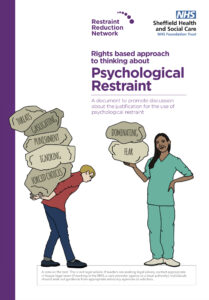
Psychological restraint is any kind of communication strategy that puts psychological pressure on people to do something they don’t want to do or stop them from doing something they do want to do.
Communication strategies might include verbal pressure (e.g., threats), non-verbal pressure (e.g., eye rolling, tutting etc.) and systemic pressure (e.g., being detained, locked in a hospital and feeling you have been made powerless by the environment).
Psychological restraint is probably the most common type of restraint but is not well known and spoken about, so it is difficult to challenge.
Many people that use the Rightful Lives Facebook group talk frequently of being made to feel powerless by the system and unsupported. They also talk about things such as:
• being observed on visits and intimidated by staff sitting with a paper and pen
• feeling as though they can’t challenge their loved ones’ care for fear of being ‘punished’ or ‘things being made worse’.
• their loved one being threatened with not having leave etc.
Psychological restraint, like other types of restraint, can breach peoples’ human rights. Psychological restraint is traumatic and results in poorer treatment outcomes.
The document linked below explains how psychological restraint breaches people’s human rights and will enable you to make effective challenges. Thank you to Salli Midgely and Sheffield Health and Social Care NHS Foundation Trust for agreeing for us to share it.
Click on the link to read it.
Psychological Restraint – a rights based framework
